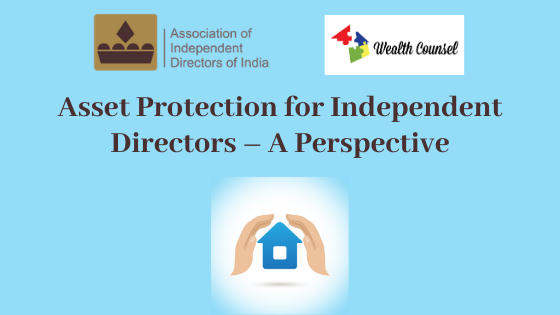In the Rs.13000 cr PNB Fraud case, National Company Law Appellate Tribunal ordered against the four Independent Directors (ID) of the Nirav Modi-led Firestar International, to freeze and attach their assets, including their bank accounts, along with that of the promoters. The order was finally stayed by the Supreme Court. In another instance, the courts have ordered the arrest of the three Amrapali Group promoter directors and to seize the passports of all the eight directors, as reported in the media. Likewise, in the ILFS case, the role of IDs came under a scrutiny. In the case of Jaiprakash Associates, about 2 years ago, the apex court of India adjudged restraining IDs, along with the promoters, from transferring any personal assets, over a group company’s insolvency issue.
The Promoter fraternity is clearly divided on the court/ tribunal orders pertaining to the IDs. While one section holds the view that it is unfair to place the entire onus on the IDs, who are only privy to the information shared with them by the management, while, the other believes that IDs are bound to closely monitor operations of the company on which they are a board member and that they should put across their views strongly in case of any governance issues to the promoters or step off such boards.
Meanwhile, a lot has happened with regards to the ‘role of an independent director’ from a regulatory perspective, culminating in the SEBI (LODR) (Amendment) Regulations, 2018. Though the court rulings in the past 2-3 years have stepped up the scrutiny on boards and increased the liability of directors, but, at the same time, the information available to the IDs is very limited – most of them rely on the promoters, management, and the auditors to keep them informed for deciding on various board matters. No wonder then, the corporate boards have been witnessing mass exodus by IDs. For instance, as per NSEinfobase, Nifty 500 companies saw 316 exits by IDs in FY19, almost 32% more than the year earlier. 50 of those quit without giving any reason, whatsoever. From a corporate governance perspective, however, such regulatory activism is a welcome move because improved governance, through flagging of non-promoter group issues, assessing related party transactions, safeguarding of minority shareholder interests and providing overall dissent in consensus-building over critical board matters, is almost a given. Moreover, an equilibrium is likely to prevail gradually.
From an individual perspective though, as an independent director, you are faced with a dual challenge of not only upholding the governance standards at the company on whose board you operate, but also to ensure preserving and managing your personal assets/ wealth from any adverse external claims, whatsoever. Some individuals as IDs on the boards of companies think of protection of their wealth, from external claims by means of Private Discretionary Family Trusts, apart from other wealth protection measures. The question, therefore, is when should wealth protection measures be initiated? Asset protection measures, or ring-fencing measures by IDs should be carried out in good times, complimenting such measures with the discharge of their duties as an ID, as required under the law.
When it comes to wealth management, most of us restrict ourselves to wealth creation and maximization. But preservation of what one has and its distribution (passing it on, the way you wish to) are rather more critical goals at that point of time in one’s lifespan. A personal CFO can provide unbiased advise in such matters to achieve the twin objectives – asset protection and wealth creation – to an independent director, who apart from his/ her own professional/ business commitments also gets busy attending board and committee meetings constituted by boards of companies. With ever increasing regulatory demands an independent director needs to ensure that he/ she is adequately protected to be able to discharge his/ her duties in a free and independent manner!
The author, Anup Kalra, is a SEBI-registered investment adviser (RIA), running a boutique advisory firm under the trade name Wealth Counsel, and works along with a team of asset managers, analysts, lawyers, estate planners, and chartered accountants in advising clients on personal finance aspects like investment management, asset allocation strategy, risk mitigation and asset protection.
We at AIDI are glad to be associated with Wealth Counsel to serve our esteemed members towards their varied personal finance goals and aspirations. In case you are keen to know more about the scope of Wealth Counsel’s services and as to how these could be of use to you, please feel free to connect with us and we’ll be happy to take it forward.

